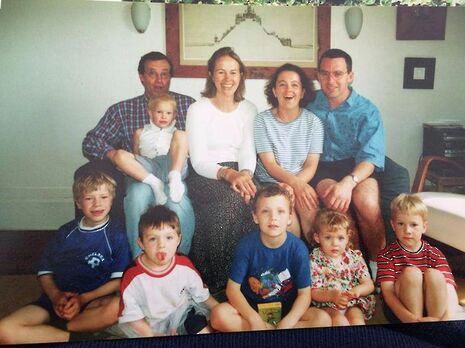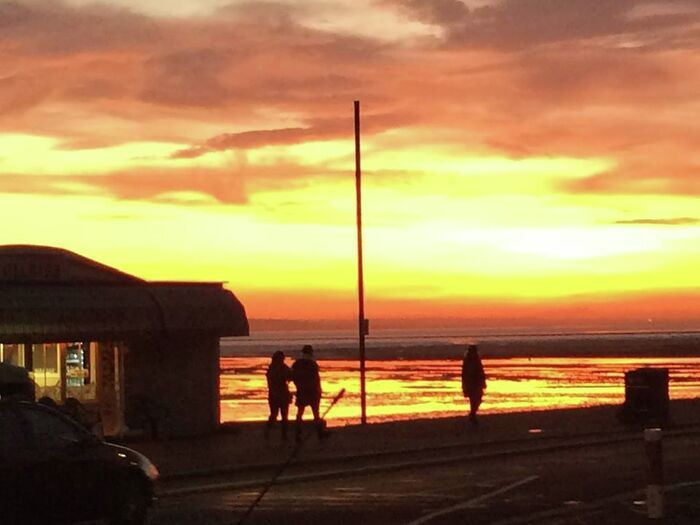Having to forgive yourself for feeling happy is a strange and incongruous thing
“Griefsters, happiness is more than a performance, and while it’s certainly not something you should force, it is something you should mean”

When I received the call that my dad had died, I was in the Blue Mountains in Australia, fortunately with some of the people he loved most dearly. As strange and disjointed an experience as it was for me, it must have been just as strange for them.
How do you go about comforting a person who has been suddenly and unexpectedly struck by tragedy? They were grieving, too, and yet felt a responsibility to their friend’s daughter as they mourned him.
I knew that I didn’t know how to be comforted — if I wanted to be comforted — if I wanted to be left alone, or surrounded by people, given hugs, given space, allowed to cry, made to laugh. The appropriate response to the death of a loved one is sadness, of course — but is it relentless sadness? In the hours, then days following my dad’s death, while a heavy sadness hung underneath everything, I was distracted in various ways by those around me. The intensity of grief, and of a grief so huge, was counteracted by card games, by walks, by jokes and kindnesses. Of course, I felt the loss with just as much of a confused intensity as I always would, but I wasn’t alone. And importantly, I felt sad, but I was also being allowed to feel, in fragments, a comforted kind of happy.
“I cried for hours on end, but I was also made to smile and laugh”
I look back on this retrospectively and feel guilty — guilty that anything could have comforted me at all. It’s still unclear to me why exactly that ought to be: just getting through those immediate weeks after the shock of my dad’s death was almost impossible at the time, and at best I drifted and forgot myself rather than retaining an idea of who I was or what I had lost. And on reflection, that fact makes it seem as though the pain should have been easy. An hour is shorter once you are looking back on it than when you are living it. But had I not been surrounded by people soothing me with hugs, talking to me about books they were rereading, or songs they loved — in essence, diverting me — I don’t know that I would’ve even made it back to England. I cried for hours on end, but I was also made to smile and laugh.
Accepting sadness paradoxically often seems a less bitter pill to me than accepting, in spite of my loss, that I will still feel happiness. When I was first grieving, knowing things would never be the same was hard; now, knowing that there will come a day I feel better feels likes a betrayal. Sadness seemed, for a long time, the only means I had of retaining the pieces of my dad left in the world. Letting it go would mean letting him go — and so even loosening my grip on heartbreak seemed a cruelty to the memory of the man who raised me with so much love.
“Happiness is more than a performance”
The long and the short of it was, and is, I knew I was entitled to my sadness. I struggle to accept that in spite of the death of my dad, I am still entitled to happiness.
I’ve taken joy, along with functionality, to be a performance — especially at university. I want people to think I’m functioning, because it would worry them if I was not. I also, then, want people to think I’m happy, because it would not only worry, but sadden them, if I wasn’t. In thinking this way I doubt I’ve been a very good friend to myself. And yet I also doubt that I’m the only one with this mindset.
Griefsters, happiness is more than a performance, and while it’s certainly not something you should force, it is something you should mean. It’s also not something for you to feel guilty over. Feeling happy does not mean forgetting the person you have lost; feeling happy does not mean neglecting your sadness. It is not a disrespect to the weight of your bereavement and it is not an indictment of your character. Just as with sorrow, it is a piece of the shifting tide of this life. You will find yourself tangled up with joy in some moments, loss in others, and often, a strange and unfamiliar mixture of the two — paired with every other volatile human emotion. Doing right by the person you grieve for doesn’t equal never feeling joy again, and you don’t let go of any pieces of them in any of your moments of happiness.
In my first column, I mentioned a friend who gave me paragraphs of advice and affirmation after my dad died. Of all her wisdom, the guidance I fear I most neglected to accept, or act upon, was that I shouldn’t feel guilty for the times I felt happy. The entirety of the first few months of my grief were so unreal I’m not sure I really did it right; in my head, my dad was on a trip, and would return home any day. A year later, and I’m still processing — or perhaps, I’ve only just begun to do so. And so the advice is just as pressing, and just as profound, as ever.
To those bereaved, feel entitled to your pain. But please, feel just as entitled to your joy. There will be miserable and hazy days, and there will be days rendered vibrant with happiness. Don’t feel guilty for either of these. And don’t mute whatever it is you feel
 News / Uni Scout and Guide Club affirms trans inclusion 12 December 2025
News / Uni Scout and Guide Club affirms trans inclusion 12 December 2025 News / Cambridge Vet School gets lifeline year to stay accredited28 November 2025
News / Cambridge Vet School gets lifeline year to stay accredited28 November 2025 Science / Did your ex trip on King’s Parade? The science behind the ‘ick’12 December 2025
Science / Did your ex trip on King’s Parade? The science behind the ‘ick’12 December 2025 News / Cambridge study finds students learn better with notes than AI13 December 2025
News / Cambridge study finds students learn better with notes than AI13 December 2025 News / Pembroke to convert listed office building into accom9 December 2025
News / Pembroke to convert listed office building into accom9 December 2025








